(1) JACQUELINE WOODSON INTERVIEW. “U.S. Book Show 2023: Jacqueline Woodson Works from Memory and Empathy” – Publishers Weekly reports from the show.
Mention Jacqueline Woodson—a former National Ambassador for Young People’s Literature—and readers begin naming favorite titles: groundbreaking LGBTQ novels (From the Notebooks of Melanin Sun), stories of BIPOC histories and identities (After Tupac and D Foster), books adapted to TV (Miracle’s Boys), and the National Book Award–winning memoir in verse Brown Girl Dreaming. At a lunch-hour keynote on May 24, Woodson sat down with bookseller Miwa Messer, executive producer and host of the Barnes & Noble podcast Poured Over, to discuss her work.
We’re here with Jacqueline Woodson, and we’ve run out of superlatives to describe her work—straight up, let’s not pretend,” Messer said, before reading an abbreviated list of Woodson’s accolades: a 2020 MacArthur Fellowship, an NAACP Image Award, and a 2023 E.B. White Award for achievement in children’s literature from the American Academy of Arts and Letters,
… “When I write, I’m very conscious of [my reader] seeing themselves in it,” Woodson said. “Is there something about how I write a character that might break that person’s spirit?” She wants to impress upon readers “that they’re not existing alone. Theirs isn’t an isolated experience.”
Warmly acknowledging her longtime editor, Nancy Paulsen, who was in the audience, Woodson explained her revision process. She reads everything aloud to hear characters’ voices, and revises scenes while “having faith [in] the picture I’m trying to paint on the page.” Her own memories and thorough research enable her to craft people and places, she said. “I think of it like a photograph that’s developing, and it becomes more clear [as] I go back into it.”…
(2) THE 84 PERCENT SOLUTION. The Hugo Book Club Blog says “The Word For ‘World’ Isn’t America”. “If the Hugo Award is to be a truly ‘World’ award, American fandom may need to relinquish it … by establishing an American award for American fiction.”
…So why is there no national award recognizing the best science fiction published by authors from the United States?
It could be argued that this is a reflection of American exceptionalism or imperialism.
The Hugo Award — when it was established in 1953 — may have billed itself as celebrating the world’s greatest science fiction, but that was for a limited definition of “world.” This was a “world” that extended no further north than Toronto, no further east than London, and no further south or west than Los Angeles. American cultural hegemony was baked into the DNA of the award.
An American national SFF award was not seen as necessary, because the Hugos existed.To date 84.2 per cent of all winners, and 84.5 per cent of the authors represented in the prose categories (short story, novelette, novella, novel and series) were born in the United States…
(3) NOT PARSELEY. NOT SAGE. NOT THYME. Craig Miller told Facebook readers about a close call at home last night.
About 9:30, roughly an hour and a half ago, headlights suddenly shined blindingly through our living room windows followed by a crash.
A minivan had come hurtling down the street, apparently missed the turn, came up between our two parked cars, over the curb, across the sidewalk, through our garden, and up our front path, finally stopping when it smashed into the cement and metal fences between our house and our neighbors.
I rushed out. The driver kept trying to back up but the car was stuck. The driver and the passenger got out. The driver had a hard time because he was in the middle of our bushes. They took off down the street.
I called the police. They’re still here. Eventually a tow truck will come and they’ll impound the vehicle.
One nice thing: they drove into and got stuck in the midst of a huge rosemary bush. All that friction in the rosemary and the yard smells terrific. One of the cops even said, “Is that rosemary? Smells great.”
(4) HOME AT LAST. Walter Jon Williams shared good news with Facebook readers. And some not-so-good news.
So Kathy’s finally home after 13 days confined to COVID jail in a hotel room on Malta.
She arrived just in time for me to catch a cold, which is definitely not COVID since I’ve tested negative two days in a row.
Timing could have been better. Definitely.
(5) GOLLUM GAME? “The Lord of the Rings: Gollum review – boil it, mash it, stick it in the bin” – a real KTF review in the Guardian.
This game never looked especially promising, and now it’s out, it’s about as riveting as listening to a huddle of ents discuss the finer points of deciduous shedding. It’s a technical disaster, at least on PC, and even when it does work, it feels like an extended forced stealth section from a game where stealth is just one of 50,000 other systems. It’s watery, janky, broken, alternately frustrating and frictionless, completely without tension or pathos, and squanders a great concept….
(7) NICE TRY, BUT NO CIGAR. “Max Will Revert Film Credits to List Directors, Writers After Backlash” reports Variety.
Warner Bros. Discovery’s newly launched Max lumped film directors and writers under a single “creators” heading — a change that prompted a backlash from filmmakers and Hollywood’s directors and writers guilds. Now the company says it is reverting the listings back to how they were presented on HBO Max, blaming the issue on a technical “oversight.”
“We agree that the talent behind the content on Max deserve their work to be properly recognized,” a Max spokesperson said in a statement to Variety. “We will correct the credits, which were altered due to an oversight in the technical transition from HBO Max to Max and we apologize for this mistake.”Max’s move to consolidate writers, directors and other creatives under the single “creators” listing drew ire amid the ongoing Writers Guild of America strike, as the union is seeking to reach a new contract with major studios through the Alliance of Motion Picture and Television Producers….
Meanwhile, if you want to know what movies and TV shows are available on the service, click on “Max – full list of movies and TV shows online” at JustWatch.
(8) TODAY’S DAY. This was news to me, but maybe not to most fans. May 25 is —
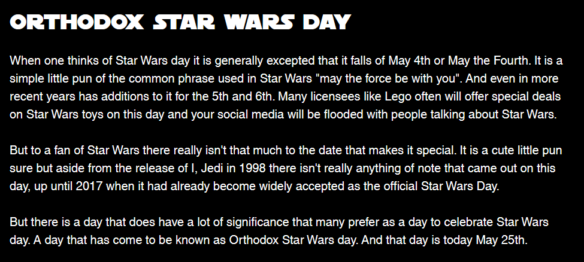
Craig Miller, author of Star Wars Memories, says, “I don’t know that I coined it but it’s a term I’ve been using for a number of years. When people started arguing about whether May 4th or May 25th is Star Wars Day, I started saying — in places like Facebook — that I consider May 25th Orthodox or Old Testament Star Wars Day. May 21st – the date The Empire Strikes Back debuted – is New Testament Star Wars Day. And May 4th is New Age Star Wars Day. It’s people using a popular pun to center around. It’s apt because, in most countries, Star Wars didn’t debut on May 25th. Further, I’ve been saying that the period from May 4th and May 25th marks Star Wars Season. Sort of like the period between Ash Wednesday and Easter is the Lenten Season.
P.S. May 25 is also Towel Day.
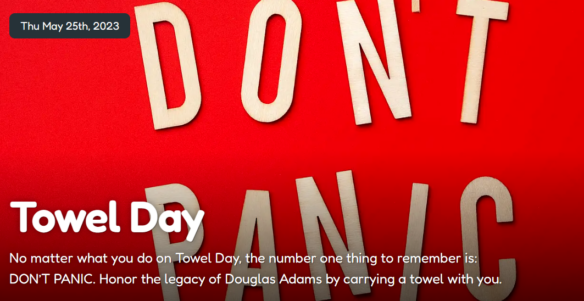
(9) MEMORY LANE.
1962 – [Compiled by Cat Eldridge.]
Philip K. Dick’s The Man in The High Castle is the source of our Beginning. I know it’s been turned into an Amazon series but y’all know that I never watch any series based off a piece of fiction that I really like and yes, The Man in The High Castle falls into that category.
It was first published by G. P. Putnam’s Sons sixty-one years ago in a hardcover edition which cost three dollars and ninety-five cents. The cover is by Robert Galster.
I really cannot say anything further as it’d spoil the novel though admittedly the cover does a fairly nice job of doing that I think.
And with that, here’s our Beginning…
FOR A WEEK Mr. R. Childan had been anxiously watching the mail. But the valuable shipment from the Rocky Mountain States had not arrived. As he opened up his store on Friday morning and saw only letters on the floor by the mail slot he thought, I’m going to have an angry customer.
Pouring himself a cup of instant tea from the five-cent wall dispenser he got a broom and began to sweep; soon he had the front of American Artistic Handcrafts Inc. ready for the day, all spick and span with the cash register full of change, a fresh e svase of marigolds, and the radio playing background music. Outdoors along the sidewalk businessmen hurried toward their offices along Montgomery Street. Far off, a cable car passed; Childan halted to watch it with pleasure. Women in their long colorful silk dresses . . . he watched them, too. Then the phone rang. He turned to answer it.
“Yes,” a familiar voice said to his answer. Childan’s heart sank. “This is Mr. Tagomi. Did my Civil War recruiting poster arrive yet, sir? Please recall; you promised it sometime last week.” The fussy, brisk voice, barely polite, barely keeping the code. “Did I not give you a deposit, sir, Mr. Childan, with that stipulation? This is to be a gift, you see. I explained that. A client.”
“Extensive inquiries,” Childan began, “which I’ve had made at my own expense, Mr. Tagomi, sir, regarding the promised parcel, which you realize originates outside of this region and is therefore—”
“But Tagomi broke in, “Then it has not arrived.”
“No, Mr. Tagomi, sir.”
An icy pause.
“I can wait no furthermore,” Tagomi said.”
“A substitute, then. Your recommendation, Mr. Childan?” Tagomi deliberately mispronounced the name; insult within the code that made Childan’s ears burn. Place pulled, the dreadful mortification of their situation. Robert Childan’s aspirations and fears and torments rose up and exposed themselves, swamped him, stopping his tongue. He stammered, his hand sticky on the phone. The air of his store smelled of the marigolds; the music played on, but he felt as if he were falling into some distant sea.
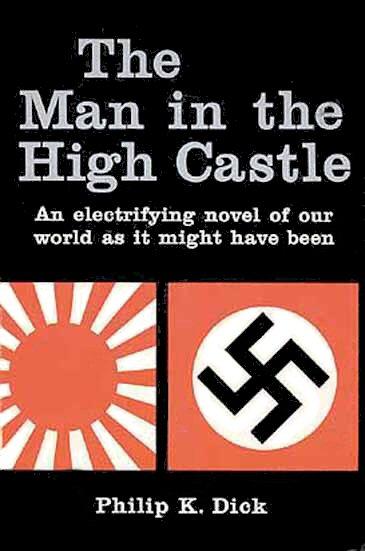
(10) TODAY’S BIRTHDAYS.
[Compiled by Cat Eldridge.]
- Born May 25, 1808 — Edward Bulwer-Lytton. In addition to the opening seven words from Paul Clifford — “It was a dark and stormy night” — he also coined the phrases “the great unwashed”, “pursuit of the almighty dollar” and “the pen is mightier than the sword.” ISFDB credits him with eight genre novels including The Coming Race, Asmodeus at Large and Last Days of Pompeii to name but three. He wrote a lot of short fiction with titles such as “Glenhausen.—The Power of Love in Sanctified Places.— A Portrait of Frederick Barbarossa.—The Ambition of Men Finds Adequate Sympathy in Women”. (Died 1873.)
- Born May 25, 1913 — Carl Wessler. Animator during the Thirties working on “Musical Memories” and other theatrical cartoon shorts for the Fleischer Studios, and a comic book writer from the Forties though the Eighties for including Charlton Comics, DC, EC Comics, Harvey Comics and Marvel. He also worked for editor-in-chief Stan Lee at Marvel’s 1950s forerunner, Atlas Comics. (Died 1989.)
- Born May 25, 1916 — Charles D. Hornig. Publisher of the Fantasy Fan which ran from September ‘33 to February ‘35 and including first publication of works by Bloch, Lovecraft, Smith, Howard and Derleth. It also had a LOC section called ‘The Boiling Point’ which quickly became angry exchanges between several of the magazine’s regular contributors, including Ackerman, Lovecraft and Clark Ashton Smith. He paid for the costs of Fan Fantasy by working as the teenage editor of Gernsback’s Wonder Stories. (Died 1999.)
- Born May 25, 1935 — W. P. Kinsella. I’d say best known for his novel Shoeless Joe which was adapted into the movie Field of Dreams, one of the few films that Kevin Costner is a decent actor in, ironic as the other is Bull Durham. Kinsella’s other genre novel is The Iowa Baseball Confederacy and it’s rather less well known that Shoeless Joe is but is excellent. He also edited Baseball Fantastic, an anthology of just what the title says they are. Given that he’s got eighteen collections of short stories listed on his wiki page, I’m reasonably sure his ISFDB page doesn’t come close to listing all his short stories. (Died 2016.)
- Born May 25, 1944 — Frank Oz, 79. Actor, director including The Dark Crystal, Little Shop of Horrors and the second version of The Stepford Wives, producer and puppeteer. His career began as a puppeteer, where he performed the Muppet characters of Animal, Fozzie Bear, Miss Piggy, and oh so patriotic Sam Eagle in The Muppet Show, and Cookie Monster, Bert, and Grover in Sesame Street. Genre wise, he’s also known for the role of Yoda in the Star Wars franchise until he was removed from that role by The Evil Mouse.
- Born May 25, 1949 — Barry Windsor-Smith, 74. Illustrator and painter, mostly for Marvel Comics. Oh, his work on Conan the Barbarian in the early Seventies was amazing, truly amazing! And then there was the original Weapon X story arc involving Wolverine which still ranks among the best stories told largely because of his artwork. And let’s not forget that he and writer Roy Thomas created Red Sonja partially based on Howard’s characters Red Sonya of Rogatino and Dark Agnes de Chastillon.
- Born May 25, 1966 — Vera Nazarian, 57. To date, she has written ten novels including Dreams of the Compass Rose, what I’d called a mosaic novel structured as a series of interlinked stories similar in tone to The One Thousand and One Nights that reminds me more than a bit of Valente’s The Orphans Tales. She’s the publisher of Norilana Books which publishes such works as Catherynne M. Valente’s Guide to Folktales in Fragile Dialects, Marion Zimmer Bradley’s Sword and Sorceress anthologies,and Tabitha Lee’s Lee’s Sounds and Furies. She has two Nebula nominations, one for her “The Story of Love” short story and another for her “The Duke in His Castle” novella.
(11) COMICS SECTION.
- Non Sequitur says Heaven is hell on editors.
- Bizarro finds the next phase in AI authors’ evolution.
- Bizarro shows part of the Darth Vader health regimen.
(12) ALLIGATOR LOKI MAKES A SPLASH IN HIS PRINT COMIC DEBUT. Alyssa Wong and Bob Quinn’s Alligator Loki #1 arrives in September.
After making his debut in Marvel Studios’ Loki on Disney+, the reptilian God of Mischief headlined his very own Infinity Comic series on the Marvel Unlimited app. Now, this iconic and adorable troublemaker will grace the stands of your local comic shop for the very first time in September! An extra-sized one-shot, ALLIGATOR LOKI #1 will collect the entirety of Alyssa Wong and Bob Quinn’s hit Infinity Comic series as well as an all-new adventure from the life of everyone’s favorite swamp-dwelling scamp!
Bow down to the reptile in a helm who has enraptured the Ten Realms…with his cuteness! First Alligator Loki chomped down on Mjolnir, and then he chomped his way into our hearts. Now, the beloved Alligator of Mischief finds – and makes – trouble all across the Marvel Universe!
For more information, visit Marvel.com.
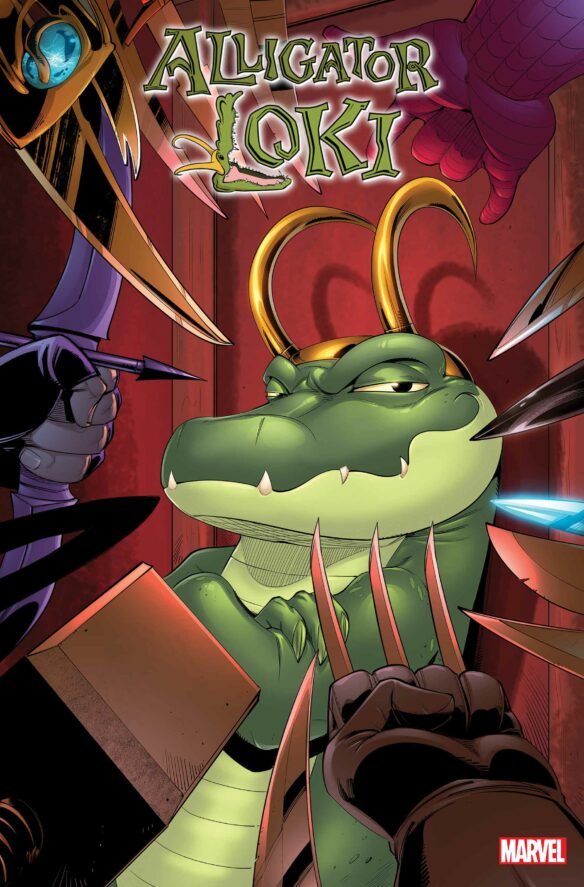
(13) LIVES IN COMICS. NBM Graphic Novels debuts two bios about people of genre interest.
- The Disney Bros.: The Fabulous Life of Walt & Roy by Alex Nikolavitch (writer) Felix Ruiz (art)
After the bankruptcy of his first two companies, the young Walt Disney decides to call on his older brother Roy to start a new business: the Disney Brothers Cartoon Studios. The combination of their opposing talents, one artistic, the other managerial, will give birth to an entertainment giant despite the difficult nature of Walt. Little by little, Walt will push his brother into the shadows and sink into chronic depression and excessive consumption of alcohol … But all this will not prevent him from producing the greatest masterpieces of animation.
The authors have chosen a cartoon style, worthy of Mickey Mouse comics, to tell a very serious story of creation, money and politics, but also… of family.
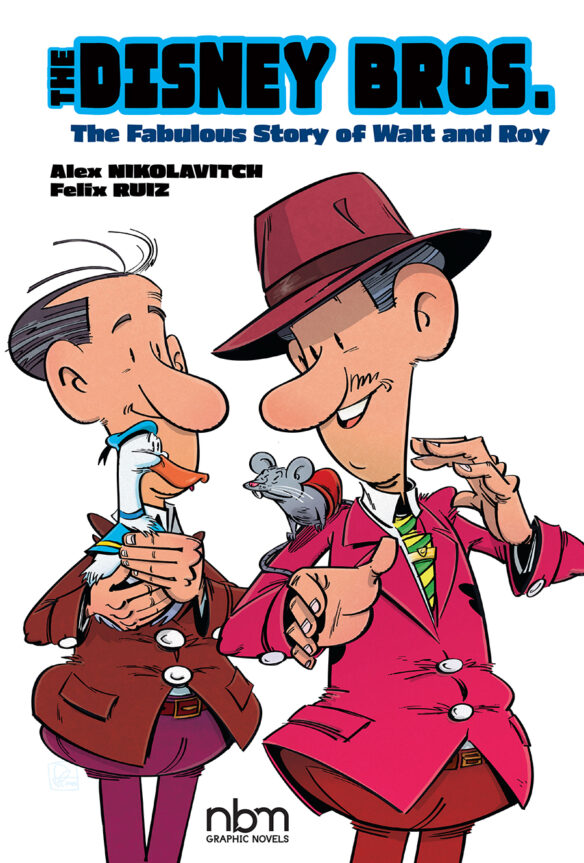
- Philip K. Dick: A Comics Biography by Laurent Queyssi (writer) Mauro Marchesi (art)
One of the greatest writers in science fiction history, Philip K. Dick is mostly remembered for such works as Blade Runner, Minority Report and Total Recall. His dark, fascinating work centered on alternate universes and shifting realities in worlds often governed by monopolistic corporations and authoritarian governments.
His own life story seems a tussle with reality, going through five wives and becoming increasingly disjointed with fits of paranoia and hallucinations fueled by abuse of drugs meant to stabilize him. His dramatic story is presented unvarnished in this biography.
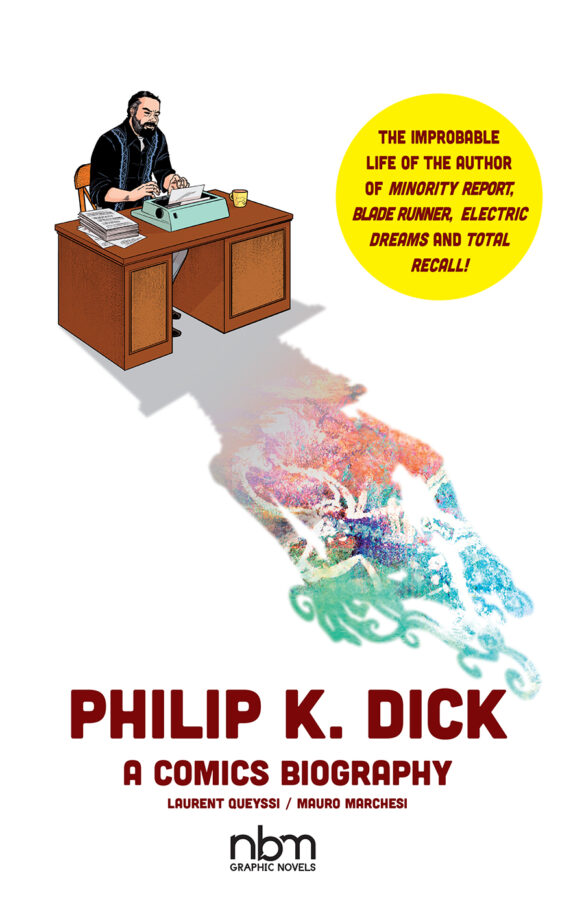
(14) OCTOTHORPE. In episode 84 of the Octothorpe podcast, “I Do Not Like to Be Delighted on Every Page”, “John Coxon, Alison Scott, and Liz Batty read A Face Like Glass by Frances Hardinge in what marks the start of the SUMMER OF FUN!”
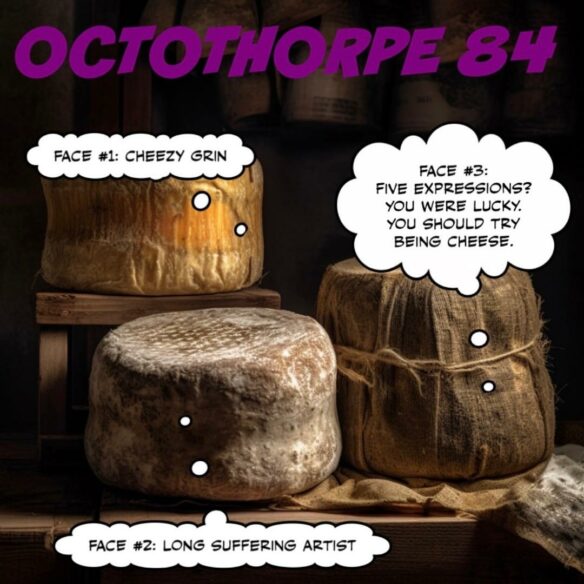
(15) BETTER LATE THAN NEVER. A lot of you will have seen this news item already, however, it’s still a fun item. “Long story: book returned to California library nearly a century late” in the Guardian.
A history book about the US has been returned to a library in California, almost 100 years overdue. The copy of Benson Lossing’s A History of the United States, published in 1881, was returned to St Helena public library in Napa Valley earlier this month. It had been due back on 21 February 1927.
At the time the book was borrowed, fines for overdue titles were a nickel (five cents) a day, meaning Jim Perry, who had the book, theoretically owed about $1,756 (£1,417). Luckily for him, the library scrapped late fines in 2019.
Perry found the copy in a box of books that belonged to his late wife, Sandra Learned Perry, according to the St Helena Star. He told the newspaper that he was “pretty sure” her grandfather, John McCormick, a descendant of one of St Helena’s oldest pioneer families, was the original borrower of the book.
Perry originally returned A History of the United States to the library’s front desk without leaving his name, but was tracked down after the library appealed for more information about the book’s history.
Library staff suspect the book was one of 540 volumes originally available from the Free Public Library, a predecessor to St Helena Public Library. The book has now been placed in a glass display case at the library’s entrance.
The Guinness World Record for an unreturned and overdue library book is held by a book owned by Sidney Sussex College, Cambridge. The history book, written in German, was borrowed in 1667 or 1668 by Colonel Robert Walpole, the father of Sir Robert Walpole, regarded as the first prime minister of Great Britain.
It was discovered by Prof John Plumb while he was working on a biography of Walpole, and returned to Sidney Sussex on 16 January 1956, at least 287 years overdue….
(16) A DEEP DIVE FOR AN ANSWER: CAN YOU HELP? S. Elizabeth of Unquiet Things tries to unravel “A Mystery That Should Not Exist: Who Is The Cover Artist For This Edition Of A Wrinkle In Time?” The guesses are still pouring in.
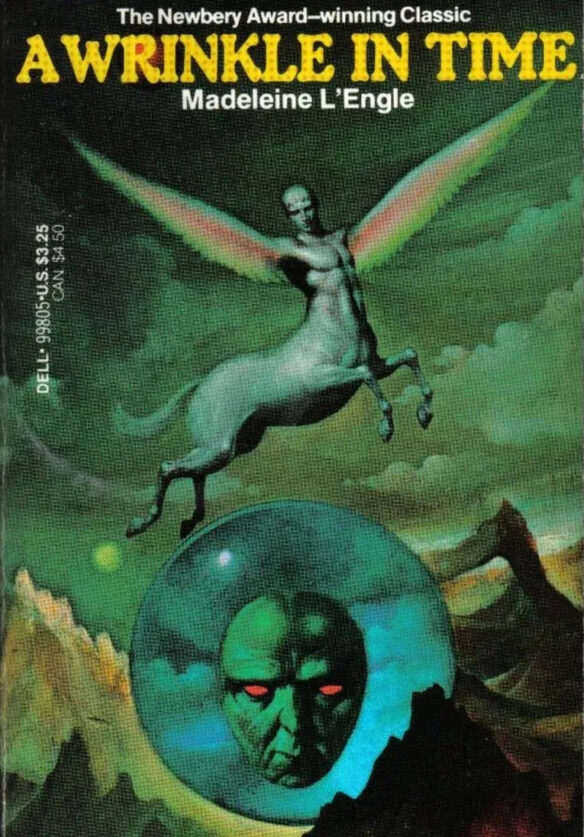
Why is it that in this current year of 2023, no one seems to know who the cover artist is for this iconic Dell Laurel-Leaf A Wrinkle in Time cover art?? In a time when we have so much information available to us at our literal fingertips, how could it possibly be that the above marvelously and terrifyingly iconic imagery is perpetually credited to “unknown artist”? Even the Internet Speculative Fiction Database, always an excellent and trusted resource, does not have an answer….
S. Elizabeth follows with all the steps in her investigation so far.
(17) VIDEO OF THE DAY. Barbie comes to theaters July 21.
To live in Barbie Land is to be a perfect being in a perfect place. Unless you have a full-on existential crisis. Or you’re a Ken.
[Thanks to John King Tarpinian, Chris Barkley, Michael Toman, N., Danny Sichel, Kathy Sullivan, Cat Eldridge, Mike Kennedy, and Andrew Porter for some of these stories. Title credit belongs to File 770 contributing editor of the day Cat Eldridge.]
Discover more from File 770
Subscribe to get the latest posts to your email.

I’m claiming First assuming that OGH doesn’t need to claim First to announce that WordPress has once again screwed up.
I’m listening to Gareth Powell’s Descendent Machine.
(3) Always thrilling! (Had a woman back across the street – wide and fairly busy – one damp Mother’s Day and hit our house. Fortunately the area inside was a closet. My mother declared Mother’s day a non-day from then on.)
@Cat, I did get email notification for this.
Cat Eldridge: Stunningly, a subscriber notification WAS sent out for this post.
(4) So glad to hear she’s home. About that cold, my std. answer: zinc gluconate (Cold-Eez or clones). They are not “homeopathic”. I was told about it in 2000, when I had a very rare for me, very bad cold. I’m used to seeing claims on bags, I’m not used to seeing citations from the NEJM and the JAMA on it.
(8) Since I first saw SW the day it opened in Philly, the later date’s closer for me… and since my Eldest’s birthday is right before, taking her to the latest Lucas film was a regular birthday present.
(17) I don’t know that I could see a movie with that much… PINK.
Today is also Lilac Day in memory of The People’s Revolution of the Glorious Twenty-Fifth of May
(16) Did Dell have a reputation for being especially bad at record-keeping during those years?
Cider wishes to proclaim the joys of chicken and rice, which totally does not include a kind of chunky pill tucked into the the chicken. I report this here because her tale of the non-existence of the pill is definitely genre.
8) The Glorious Twenty-Fifth of May! Truth, Justice, Freedom, Reasonably Priced Love, and a Hard Boiled Egg! Let us never forget the People’s Republic of Treacle Mine Road.
All the little angels rise up, rise up.
All the little angels rise up high!
How do they rise up, rise up, rise up?
How do they rise up, rise up high?
They rise heads up, heads up, heads up, they rise heads up, heads up high!
News: CBS News did a segment on Warner Brothers’ “secret” warehouse where they keep iconic props from many of their works, including several Batmobiles, classic cars from “The Great Gatsby” and others, and lots of individual props from “Where the Wild Things Are,” The Guinevere wedding dress from the film “Camelot.” Christopher Reeves’ costume from the first Superman movie (and 100,000 other costumes). Here’s the link:
https://www.cbsnews.com/video/the-magic-of-hollywood-cbs-gets-rare-peek-inside-warner-brothers-prop-archive/
(2)
Yeah, now do the percentage of all SF novels that are published in the U.S.
Considering that there are a number of scenarios in which every Hugo winner this year (or even every Hugo nominee) is Chinese, this is an odd year to pick to try to agitate about that.
Trolls gotta troll, I guess.
@Brian.
Later on in the article, the author also notes the same thing, that most nominees might be Chinese these year. Which is presented as another reason to have an American national award.
Why the Nebulas don’t count is not explained.
bookworm1398: Probably they would make the same critique of any pretentions by the Nebula to being a truly international award based on the proportion won by Americans. But a point in favor of your idea is that SFWA deleted “America” from its name last year.
@Brian
Not every opinion that you disagree with is “trolling.”
Look, all human institutions are flawed. Awards have systemic biases.
I love the Hugos. Passionately. But I also recognize those flaws.
It’s just worth talking about the biases in the system, and who those systemic biases privilege.
Every award and every award system has biases. Recognizing those biases is a step in addressing them.
2) If we had listened to Patton at the end of World War II and established the American Empire, this wouldn’t be an issue now, would it?
I dont really see an issue here. If the Hugo Award becomes some version of a “truly” international award, (and there is a lot that needs addressing for that to happen) there’s no reason why the North American Science Fiction Achievement Awards couldn’t be tacked on, either awarded at Worldon in conjunction with the International Science Fiction Achievement Awards, or at a NASFiC.
Amazingly, a very high percentage of the fan awards were won by people born in Monmouthshire, Wales
(3) Yikes!
(16) A lot of the paperback publishers either did not keep great records — and sadly, did not tend to credit their cover artists. Maybe they didn’t think it mattered to the hoi polloi who read paperbacks. 😉
Sometimes, the cover artists are revealed years later because the original cover art is found — with a signature. There have been some surprises. There was a Gothic romance comic that experts attributed to someone else for years, but when the original painting was found, it turned out to be by George Ziel.
@OlavRokne:
Sure, but I’m okay calling this one trolling.
The Hugos do have systemic biases: Most obviously, they’re selected by members of Worldcon, which introduces a certain set of biases (e.g., income level, English-speaking, etc.) to the situation.
The logical conclusion of this individual’s post is that Worldcon isn’t truly Worldcon and/or that WSFS should take certain actions to make Worldcon more part of World SF fandom as opposed to American-dominated Western SF fandom.
This is, of course, an odd year to make this argument, considering that the WSFS’ desire to do exactly that has led to the Chengdu clusterfuck, as well as one in which literally the only reason Western fandom is going to get Worldcon back afterwards is because the Chinese government didn’t care enough to jump through the hoops necessary to keep it in China permanently.
But, sure, if someone wants to make the argument that WSFS should do more to include marginalized non-American (and really, non-Western) SF fans, that’s at least an argument that a person can make.
But this individual doesn’t make that argument. Instead, the argument is that someone at some con somewhere should have an American-specific SF award, which kind of has fuck-all to do with the Hugo Award.
“The lack of an American SFF award ends up disprivileging non-American authors” is insane troll logic. Sounds good on Twitter, I’m sure, but that’s about it.
This individual’s argument is that if some con somewhere did an American-only SF award (and, these days, I literally wouldn’t swear that there doesn’t exist some white nationalist SF con that’s already doing that), that the Hugo Award would no longer be seen as the primary award for fans of American SF to care about (because reasons, I guess), and would (handwave) magically transform the Hugo into an award that lesser-known non-American authors this individual thinks are superior would win instead of more-well-known American authors.
There’s just so much wrong in this argument that I want to believe that they’re trolling, since the alternative is that someone actually thinks that argument makes sense.
The primary systemic bias in the Hugos is that they are limited to English language works (translations included, natch). The largest population where English is the primary/first language is in the United States.
(BTW, I note that framing of the issue in the article artfully elides the fandom from Australia and New Zealand).
If this is a problem, then the simplest solution would be to change the bylaws to remove the word “English” from the eligibility requirements. Shortly thereafter, Worldcon and the Hugos will cease to be a significant concern for English language readers.
Alternatively, fans could initiate a new “international” award that would be less Anglo-centric. If the winners are better than what the Hugos produce, then the Hugo Awards will diminish.
Given that we are not awash in translated genre stories that are better than what native English speakers produce (and that translations of English-language tales do quite well around the world), I have a hard time believing that a new award would significantly alter things.
Regards,
Dann
I know some who are constantly drunk on books as other men are drunk on whiskey. – H.L. Mencken
@Brian
The site where the article appears is maintained (and in part written by) Olav.
Regards,
Dann
Tolerance always has limits – it cannot tolerate what is itself actively intolerant. – Sidney Hook (1975). “Pragmatism and the tragic sense of life”
Well, it isn’t intended as such.
When I troll, I troll much harder than this.
The lack of national SFF award for the USA implicitly makes an argument that it’s not necessary, that America will always dominate in the global award categories.
Whether or not it changes the outcome of the Hugos is debatable, sure. Personally, I sort of think the Hugos are changing already, and the creation of an American award for SFF would mostly just recognize the ongoing and existing changes to the Hugos.
(And this year is kind of an odd year. There’s a chance that America’s dominance of the Hugos might not happen this year, and there’s some amazing American SFF this year that might get snubbed by the Hugos as a result.)
It doesn’t have to be an expression of future confidence in Americans winning awards.
It could be that there’s not enough of a potential market for a new American award, since the people who would care about Americans winning are still seeing Americans win.
Seems to me like the first step towards making Worldcon truly international would be to create equivalents to Nasfic for some other continents. At the very least, it seems like there should be a Eusfic for years when Worldcon isn’t in Europe. We may or may not be ready for Asfic (may need to workshop the name for the Asian one), Sasfic, Afsfic, and Ausfic.
Well, we do have Eurocon, which happens every year, regardless where Worldcon takes place.
Yeah, not quite the same thing because it’s not associated with Worldcon/WSFS. (And deliberately so, I believe.) There have been suggestions to split Nasfic off from Worldcon to make it its own thing, similar to Eurocon, but I think it would be more interesting to have Worldcon gradually become more of a distributed thing, with regional events in multiple regions.
@Dann665
This isn’t true, which is kind of the point of the article.
It’s true that the Hugos have traditionally been awarded for English-language work – I don’t think anything non-English has ever even been nominated, let alone won (the nomination for Three Body was for the English translation rather than the Chinese original).
But the only language limitation in the rules is for translations; original works can be in any language. And with this year’s Worldcon being in China, and the nomination form explicitly mentioning that Chinese works are eligible, it’s likely that most of the nominees this year will be in Chinese.
I think the original article is kind of missing the point by talking about the United States rather than English – nobody really cares whether an author is from the US rather than the UK, Canada, Australia etc. But it’s absolutely right that Anglophone arrogance has meant that we’re looking at a situation where books in English might be shut out what was historically the biggest award for English-language SFF.
@Olav Rokne:
I think the only thing the lack of an American-specific SFF award is implying is that universally, every single convention and fan organization to-date that has decided that the world needs one more SFF award has found that particular concept to be uninteresting.
Let’s be honest. If some con announced they were going to be handing out a ‘Murican-only SFF award, (1) I think we all know what political philosophy that con was trying to strongly align themselves with, (2) far from this automatically becoming a major award, they would be roundly mocked in most corners of fandom I’d want to associate with, and (3) this would have absolutely zero effect on what wins Hugo Awards.
Also, I think it’s meaningless to point to 84% of awards being given to American SF without also figuring out what percentage of professionally-produced English-language SF is American. If you’re going to argue that Americans are winning a disproportionate percentage of awards, feels like it’s incumbent on you to first establish what the actual proportions are.
Beyond that, I think there’s an argument to be made here, but it’s not the one you’re making.
To me, the overlap between SF markets in the Western world is significant enough that national borders don’t feel overly meaningful. The top Canadian/British/Irish/Australian/etc. SFF authors seem well-represented in the Hugos, and there’s a reason why one category was known for a while as the “Best Doctor Who award.”
However, if you want to argue that the Hugo Award has a strong bias toward works written in or translated into English, though, that seems inarguable. It’s also something rather intrinsic to an award being decided by popular vote of a predominantly-English-speaking group, but it’s at least an issue that I think could be raised with a straight face and discussed by serious people.
(Personally, I was deeply disappointed that the list of Hugo nominees at Nippon 2007 didn’t have a strong presence by Japanese authors and Japanese productions. I thought this was a huge missed opportunity, and implied to me a failure on the part of the con organizers in getting the local fanbase engaged. While the Chengdu situation is slightly different–there will be a political component to what gets nominated/wins there, and I would expect the con committee to take an active hand in making sure nothing gets honored that could blow back on them–still, there’s a level where I hope this becomes an opportunity for Western fandom to be exposed to SFF they didn’t even know existed.)
But… a national award does absolutely nothing about this. To the extent there are systemic biases in the Hugo Awards against under-represented parts of the world, particularly the non-English-speaking parts, having a separate national American-only SFF award somewhere has zero effect. There’s simply no connection there. No logic between the A and the B.
“Implicitly makes an argument” is doing a lot of heavy lifting above, and nicely elides that as far as I know, this isn’t actually a thing that anyone designing the rules for these awards took into consideration. The idea that the disparate groups behind literally every SFF award given out in the U.S. are all trying to ‘make an argument’ feels silly.
Is it going to have an impact if we have a year in which the Hugos go exclusively to works produced in the Worldcon’s host country? Yeah, probably. Might even lead to some rules changes and/or a Retro-Hugo-like thing years down the line. Will be sad for the authors for whom this was their year to miss out… but, let’s be fair, it’s not like there aren’t enough other awards around that they’ll still qualify for.
Dann665 on May 26, 2023 at 8:30 am said:
Where does it say that in the WSFS Constitution? The general eligibility rule is WSFS Constitution section 3.2.1, which refers only to works that appear for the first time during the previous calendar year, without any mention of language.
Yes, works first published in a language other than English get an additional shot at eligibility if published in English translation in a different year. This gives the work more of a chance at the Award, not less.
Could you suggest the actual technical wording, such as pointing where in the existing rules you would make such deletions? I suggest that you wouldn’t want to make a change that made non-English-language works less likely be recognized.
Now I’m aware that there are people who simply assume that only works published in English, and only works published in the USA, are eligible. There are British publishers who told some of us working on the previous Glasgow Worldcon that the Hugo Award is only for works published by Americans in English even when the Worldcon was in the UK. This isn’t the case, and why even professionals in the field think that is frustrating to say the least.
Hint: removing the places where language of publication and country of publication are mentioned would make non-English-language and non-US-first-publication works less likely to be on the ballot. The rules regarding translations and country of publication were instituted to make those works more likely to be recognized.
Kevin Standlee: Dann either made a mistake about the rules or how he expressed the status under the rules, however, besides the correction you add another important point. It was recognized many years ago that because English was the language of most of the voters non-English works weren’t making the ballot — it’s an award that emphasizes people voting for things they have read and loved, and works in languages the voters can’t read don’t become finalists. So an effort was made to offset that bias by allowing an extra eligibility period if such works appeared in English translations. A second bite of the apple, as the saying goes.
There have been Worldcons in several countries with a different primary language (Germany, the Netherlands, Finland, Japan) without a work in the language of the host country making the ballot. (In the first three instances, most of the members at the time Hugo nominations were open still probably had English as their primary language.) I am hoping for a radically different look from Chengdu.
Mike, Kevin, and Kevin P
You are correct. I misspoke.
The eligibility rules do imply (to me) that English language works are largely what is expected. I can see where a non-English language work could well be nominated. It also appears to me that there are additional advantages extended to all works published outside of the United States as they receive extended eligibility by dint of then being later published in the United States.
That being said, I maintain that the referenced article is a solution in need of a problem. If works in other languages were superior to what is available in English, then they would be far more prevalent in the list of finalists. Conversely, English language authors would not enjoy significant success when their works are translated into other languages.
Regards,
Dann
We’re born with success. It is only others who point out our failures, and what they attribute to us as failure. – Whoopi Goldberg